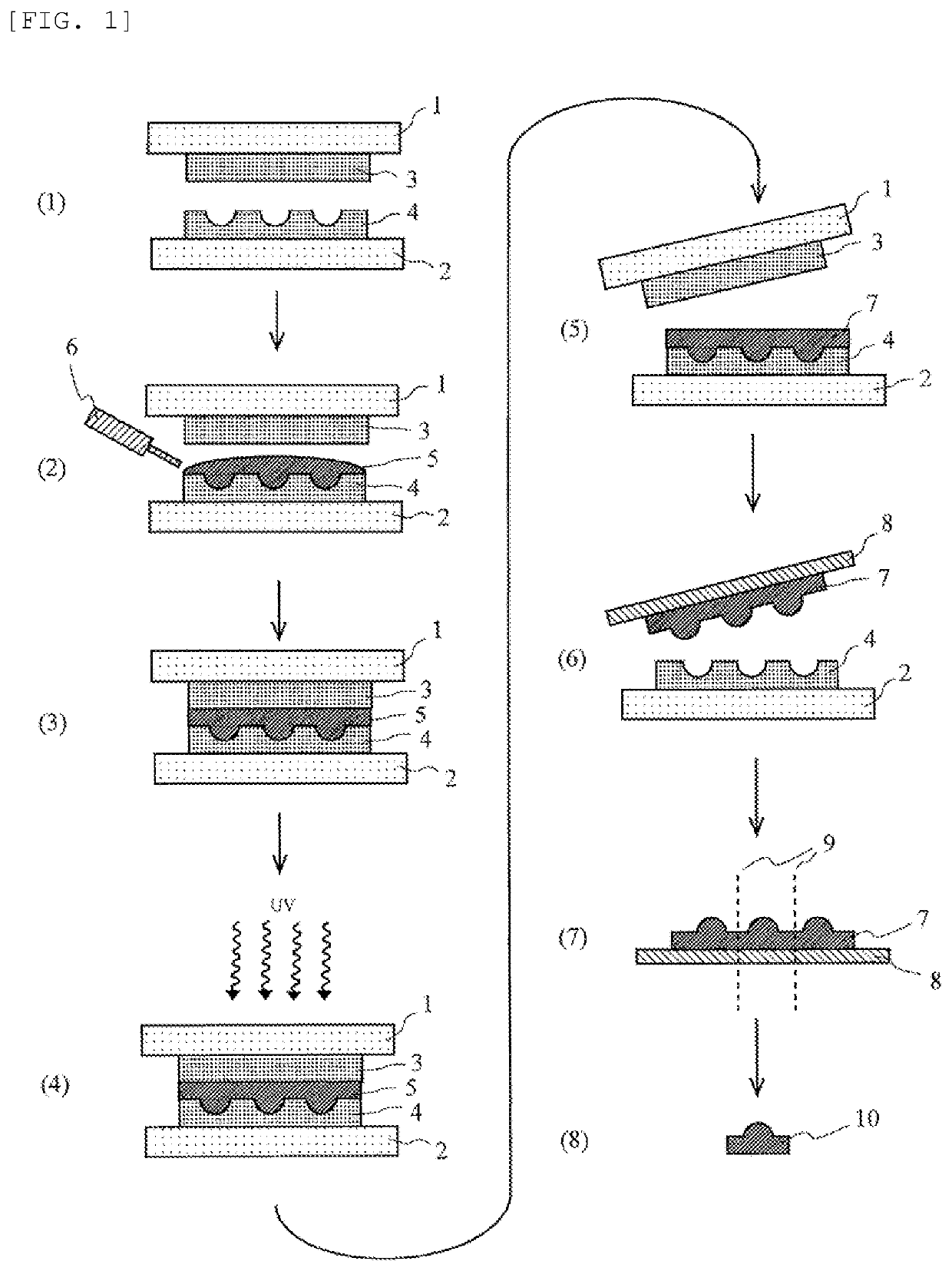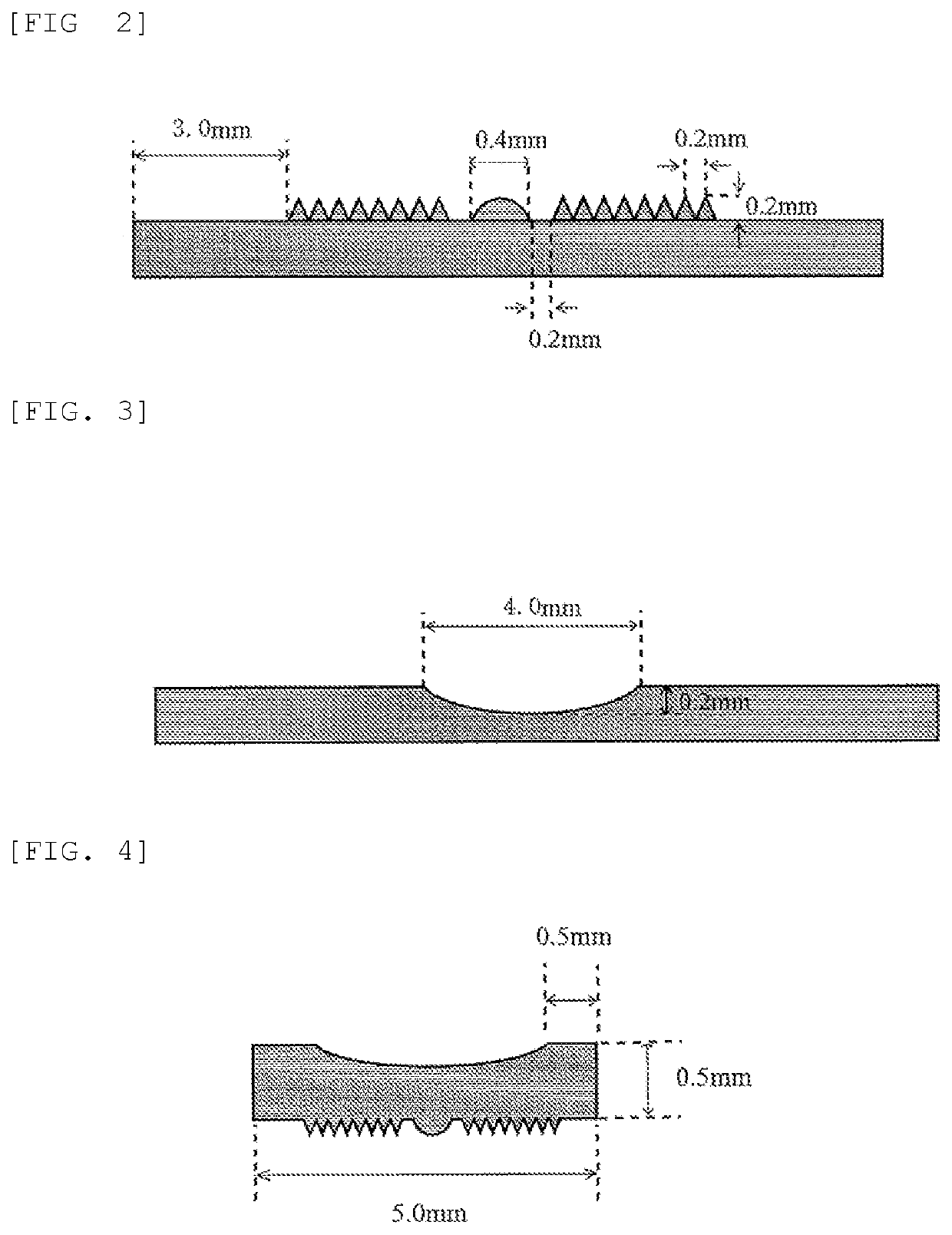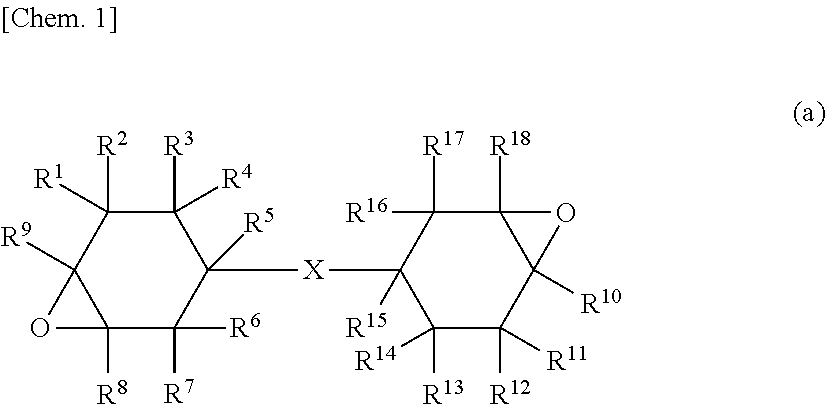Curable composition and cured product from same
a composition and composition technology, applied in the field of cureable compositions, can solve the problems of unachievable cured products, difficult to achieve high accuracy/precision, and the swelling of silicone molds, etc., to achieve high economic efficiency, long service life, and high accuracy.
- Summary
- Abstract
- Description
- Claims
- Application Information
AI Technical Summary
Benefits of technology
Problems solved by technology
Method used
Image
Examples
preparation example 1
4′-diepoxy)bicyclohexyl (a-1)
[0201]A dehydration catalyst was prepared by mixing and stirring 70 g (0.68 mol) of 95 weight percent sulfuric acid and 55 g (0.36 mol) of 1,8-diazabicyclo[5.4.0]undecene-7 (DBU) with each other.
[0202]A 3-L flask was charged with 1000 g (5.05 mol) of hydrogenated biphenol (4,4′-dihydroxybicyclohexyl), 125 g (0.68 mol in terms of sulfuric acid) of the above-prepared dehydration catalyst, and 1500 g of pseudocumene, and was heated, where the flask was equipped with a stirrer, a thermometer, and a distillation pipe being packed with a dehydrating agent and thermally insulated. Water production was observed from around the time point when the internal temperature exceeded 115° C. The heating (temperature rise) was further continued up to the boiling point of pseudocumene (to an internal temperature of 162° C. to 170° C.), and dehydration reaction was performed under normal atmospheric pressure. The by-produced water was distilled and discharged through the d...
preparation example 2
epoxycyclohexylmethyl) Ether (a-2)
[0206]In a 5-L reactor, 499 g (12.48 mol) of (granular) sodium hydroxide and 727 mL of toluene were placed. After nitrogen purging, a solution of 420 g (3.74 mol) of tetrahydrobenzyl alcohol in 484 mL of toluene was added, followed by aging at 70° C. for 1.5 hours. Next, the mixture was combined with 419 g (2.20 mol) of tetrahydrobenzyl methanesulfonate, aged under reflux for 3 hours, cooled down to room temperature, combined with 1248 g of water to stop the reaction, and the reaction mixture was separated into an aqueous layer and an organic layer.
[0207]The separated organic layer was concentrated, subjected to distillation under reduced pressure, and yielded di-tetrahydrobenzyl ether as a colorless, transparent liquid (in a yield of 85%). The 1H-NMR spectrum of the prepared di-tetrahydrobenzyl ether was measured as follows:
[0208]1H-NMR (CDCl3): δ 1.23-1.33 (m, 2H), 1.68-1.94 (m, 6H), 2.02-2.15 (m, 6H), 3.26-3.34 (m, 4H), 5.63-7.70 (m, 4H)
[0209]In ...
PUM
| Property | Measurement | Unit |
|---|---|---|
| viscosity | aaaaa | aaaaa |
| transmittance | aaaaa | aaaaa |
| viscosity | aaaaa | aaaaa |
Abstract
Description
Claims
Application Information
 Login to View More
Login to View More - R&D
- Intellectual Property
- Life Sciences
- Materials
- Tech Scout
- Unparalleled Data Quality
- Higher Quality Content
- 60% Fewer Hallucinations
Browse by: Latest US Patents, China's latest patents, Technical Efficacy Thesaurus, Application Domain, Technology Topic, Popular Technical Reports.
© 2025 PatSnap. All rights reserved.Legal|Privacy policy|Modern Slavery Act Transparency Statement|Sitemap|About US| Contact US: help@patsnap.com



